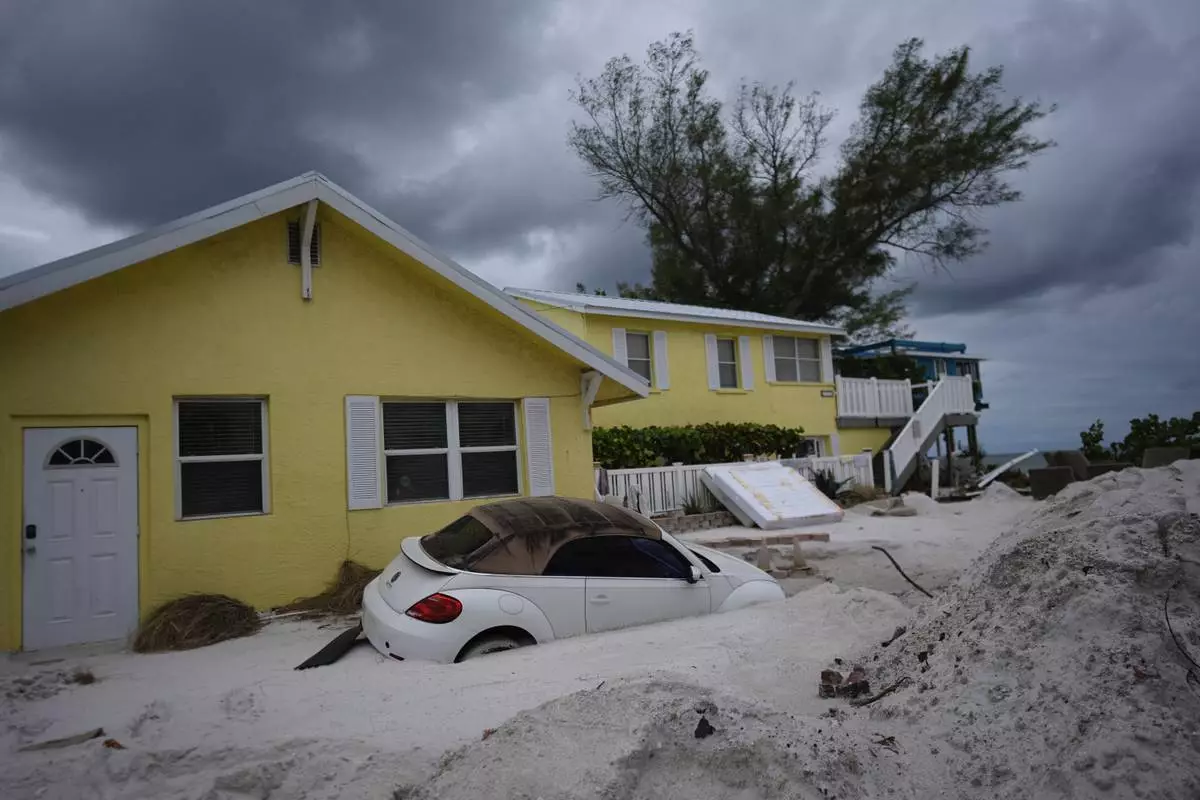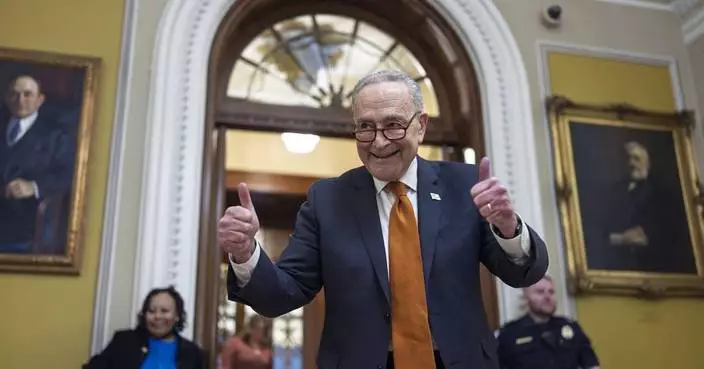MANCHESTER, England (AP) — England and English soccer teams could be removed from UEFA competitions if a new regulator is considered to be “Government interference” in the sport.
In a letter sent by UEFA to the U.K.'s new culture secretary, Lisa Nandy, European soccer's governing body raised concerns about a proposed independent football regulator (IFR) in English soccer. The regulatory will ensure the financial sustainability of clubs and stop teams from joining breakaway competitions like the European Super League.
UEFA regulations state there should be no government interference in the running of soccer.
“We have specific rules that guard against this in order to guarantee the autonomy of sport and fairness of sporting competition; the ultimate sanction for which would be excluding the federation from UEFA and teams from competition,” UEFA general secretary Theodore Theodoridis wrote in his letter, which has been seen by The Associated Press.
England, which has been runner-up in the last two European Championships, is co-hosting the 2028 edition of the tournament.
If UEFA imposed its ultimate sanction of excluding the English Football Association, the England team would be barred from competing in the Euros. It could also mean Premier League clubs being barred from the Champions League and other competitions.
The U.K. government’s Football Governance Bill would give an independent regulator powersto safeguard the future of clubs. It includes strengthened tests over who can run or own clubs.
In its letter, UEFA said “normally football regulation should be managed by the national federation.”
It said it was concerned by what it described as “scope creep” by a regulator into areas beyond “the long-term financial sustainability of clubs and heritage assets.”
UEFA said if all countries established regulators with wide-reaching powers it would hinder its ability to maintain effective governance across Europe. It wants England's regulator to be “strictly limited” to the long-term financial sustainability of clubs and heritage assets.
A U.K. government spokesperson said “the Football Governance Bill will establish a new Independent Football Regulator that will put fans back at the heart of the game, and tackle fundamental governance problems to ensure that English football is sustainable for the benefit of the clubs’ communities going forward.”
James Robson is at https://twitter.com/jamesalanrobson
AP soccer: https://apnews.com/hub/soccer

FILE - The UEFA Euro trophy is pictured after Britain and Ireland were elected to host the Euro 2028 football tournament during the the UEFA EURO 2028 and 2032 hosts announcement ceremony after the UEFA Executive Committee, at UEFA Headquarters, in Nyon, Switzerland, Oct. 10, 2023. (Jean-Christophe Bott/Keystone via AP, File)
WASHINGTON (AP) — Congress is allocating more than $100 billion in emergency aid designed to address extensive damage caused by disasters after this week's scramble to find consensus on a government spending bill.
The money comes after back-to-back hurricanes — Helene and Milton — slammed into the southeastern United States this fall, leaving havoc in their wake. But the money would go to much more than just those two storms under the bill signed Saturday by President Joe Biden that keeps the federal government funded through March 14.
The disaster funding looked set to pass earlier this week until President-elect Donald Trump issued new demands that tanked a compromise and threatened a pre-Christmas federal shutdown. A slimmed-down version cleared Congress early Saturday when Republicans abandoned Trump's core request.
Here's a look at what's in the bill for disaster relief and where the money will go:
The Federal Emergency Management Agency's disaster relief fund is essentially the country's checkbook for emergencies. Out of it, the government reimburses states and local governments for things such as removing debris accumulated after hurricanes or overtime costs for firefighters and police who work during disasters.
It also includes money for individual residents, ranging from the $750 payments that disaster survivors can get to $42,500 that some uninsured homeowners can receive to help them rebuild.
Esther Manheimer, mayor of Asheville, the largest city in the North Carolina mountains that was hard hit by Helene, said city officials were pleased to see th additional disaster dollars.
It’s only been four weeks since Asheville residents could drink from and bathe in the water coming out of their faucets. Some businesses in western North Carolina have shuttered permanently or are struggling to survive, and well over 200 roads in the region remain closed.
In a statement earlier in the week, Manheimer emphasized that it was still going to be a long recovery and that "already we see the long-term economic, budgetary and employment impact Helene left in her wake.”
The disaster relief fund was nearly running on fumes after Helene and Milton. FEMA Administrator Deanne Criswell warned during a Senate hearing in November that the fund was down to $5 billion.
The Biden administration had asked Congress for about $40 billion for the relief fund but the bill eventually passed provides a lower amount, $29 billion.
It’s important to keep in mind that this isn’t the only money for the disaster relief fund, said Stan Gimont, a senior adviser for community recovery at Hagerty Consulting. He used to run the community development block grant program at the Department of Housing and Urban Development.
More money can and likely will be designated to the fund later when Congress does a full-year appropriation, he said.
There's also about $21 billion in disaster assistance to help farmers.
North Carolina Agriculture Commissioner Steve Troxler said earlier this week that he was pleased by the agricultural aid but that the state has a lot of specialty crops such as sweet potatoes and Christmas trees that are generally not covered by federal programs. He said he will have to wait and see what specifically ends up being covered.
“We are still evaluating the bill as there are a lot of nuances in it. The devil is in the details," he said.
Other money will go toward rebuilding damaged roads and highways ($8 billion), while more money (about $12 billion) would go toward helping communities recover through HUD grants.
The block grant money is one of the key funds for homeowners who don’t have insurance or enough insurance to recover from disasters.
There’s also $2.2 billion for low-interest loans for businesses, nonprofits and homeowners trying to rebuild after a disaster.
But the money doesn't go just toward local residents.
For example, there's money for the military to address damage from hurricanes and typhoons and for a new hurricane hunter — the planes used to research hurricanes — and funds to help NASA rebuild hurricane-damaged facilities.
No. The money goes to cover more than those two disasters.
Some of the money is specifically earmarked for certain projects such as $1.5 billion designated for assistance after the largest wildfire in New Mexico’s recorded history — the Hermit’s Peak/Calf Canyon fire — and the rebuilding of the Francis Scott Key Bridge in Baltimore.
But a lot of the money also goes more generally toward major disasters that happened in recent years.
The types of disasters covered in the legislation include droughts, wildfires, hurricanes, floods, derechos, and smoke exposure.
Gimont points out that disaster recovery can take a long time so the country is both paying for disasters that happened previously while it prepares for events that will happen in the future.
Take the massive Maui fire, for instance. It decimated the Hawaiian town of Lahaina last year, but Gimont said just the cleanup itself extended into late summer 2024.
Loller reported from Nashville, Tennessee.

FILE- North Carolina Gov. Roy Cooper, right, and Deanne Criswell, Administrator of the U.S. Federal Emergency Management Agency, await the arrival of Democratic presidential nominee Vice President Kamala Harris for a briefing on the damage from Hurricane Helene, at Charlotte Douglas International Airport, in Charlotte, N.C., Oct. 5, 2024. (AP Photo/Chris Carlson, File)

FILE - Michael Vierra looks at his house after it was destroyed by a wildfire, in Lahaina, Hawaii, Sept. 26, 2023. Authorities in Maui strongly encouraged homeowners to wear protective gear provided by nonprofit groups when visiting their properties to protect against asbestos, lead and other toxic remains of the wildfire. (AP Photo/Mengshin Lin, File)

FILE - Homes consumed in wildfires are seen in Lahaina, Maui, Hawaii, Aug. 16, 2023. (AP Photo/Jae C. Hong, File)

FILE - As Hurricane Milton approaches, a car sits half-buried in sand in Bradenton Beach, Fla., in the aftermath of Hurricane Helene, Oct. 8, 2024. (AP Photo/Rebecca Blackwell, File)

FILE - This photo provided by the North Carolina Department of Transportation shows the collapsed eastbound lane of I-40 into the Pigeon River in North Carolina near the Tennessee border, Sept. 28, 2024. (N.C. Department of Transportation via AP, File)

FILE - A man walks near a flooded area near the Swannanoa river, effects from Hurricane Helene , Friday, Sept. 27, 2024, in Asheville, N.C. (AP Photo/Erik Verduzco, File)

FILE - Ben Phillips, left, and his wife Becca Phillips scrape mud out of their living room in the aftermath of Hurricane Helene, in Marshall, N.C., Oct. 1, 2024. (AP Photo/Jeff Roberson, File)

FILE - Damage from Hurricane Helene near Asheville, N.C., is seen during an aerial tour for President Joe Biden, Oct. 2, 2024. (AP Photo/Susan Walsh, File)


















